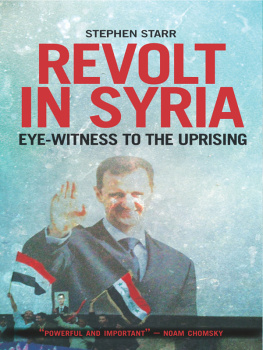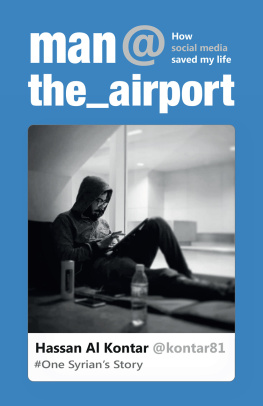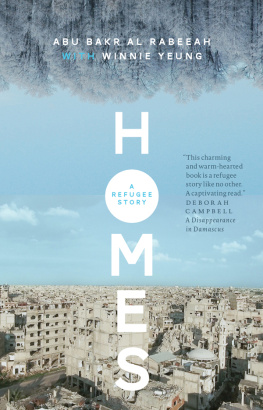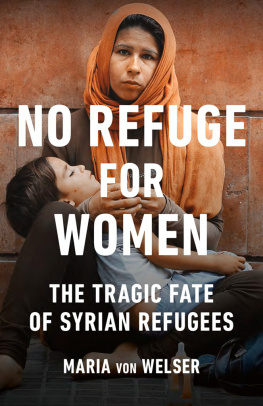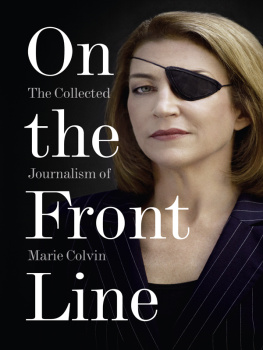Marie Brenner
A PRIVATE WAR
MARIE COLVIN AND OTHER TALES OF HEROES, SCOUNDRELS, AND RENEGADES
For Ernie and for Peggy, and always for Casey and for Marie Colvin and all who put themselves in harms way to report the truth
There is always one moment in childhood when the door opens and lets the future in.
Graham Greene

To understand the arc of her career, you have to know how it ended.
Marie Colvins last assignment was in February 2012, in a ravaged war zone in Syria. She operated from what she called a media center in the town of Baba Amr, crouched with a few other journalists in a small building in narrow streets. The top floor had been blown off by the deluge of rockets and shells raining down from the forces of the dictator Bashar al-Assad. Now, on a Wednesday morning in the early hours, the American-born foreign correspondent who worked for decades for the Sunday Times of London awakened to the convulsions of rockets and shells around her.
The night before, shed left her shoes outside in the hallthe gesture, her longtime colleague and friend Jon Swain noted later, would cost her life. With her was Sunday Times photographer Paul Conroy, fraught with anxiety because he was certain Colvins insistence on returning to Baba Amr could end in catastrophe. But Colvin was there to record it all: Snipers on the rooftops of al-Baath University shoot any civilian who comes into their sight. It is a city of the cold and the hungry, echoing to exploding shells and bursts of gunfire. There was, of course, no telephone or electricity. Freezing rain filled potholes and snow drifted through the windows during the coldest winter anyone in Baba Amr could remember, Colvin wrote. Many of the dead and injured are those that risked their lives foraging for food, Colvin wrote.
The essence of that detail was what mattered to Colvin most: the need to bring to vivid life the human costs of war. Sprinting through a barrage of rockets, Colvin spent a day in a makeshift clinic, interviewing victims. The Sunday Times bannered her report across two pages. Later it would be noted that hers was one of the first convincing reports predicting al-Assads genocide, which would overtake Syria. After her first piece was filed, Colvin mailed her colleague Lucy Fisher, I did have a few moments when I thought, What am I doing? Story incredibly important though. Mx. She demanded to return to Baba Amr and would not hear otherwise. It is sickening that the Syrian regime is allowed to keep doing this, she wrote her editor when she returned three days later. There was a shocking scene in an apartment clinic today. A baby boy lay on a head scarf, naked, his little tummy heaving as he tried to breathe. The doctor said, We can do nothing for him. He had been hit by shrapnel on his left side. They just had to let him die as his mother wept.
This is insane, Marie, Conroy told her angrily when she announced she had every intention of returning. Assad has targeted you and all the journalists. Trained in the British military, Conroy understood the peril. He also had an acute sense of Maries vexed tech skills. She was a woman of a certain age, who had started her career when you dictated a story over the phone to an editor. Often, in the field, Conroy would retrieve lost files that had vanished into the nether land of her laptop. How could she ever truly understand the consequences of dialing from a SAT phone in an area where an enemy was trying to track her location? He argued with her in the tunnel, until she stalked off, saying, Save a place for me at the bar. Then he followed her, terrified of what could happen if he was not, as always, by Maries side.
I arrived in London a few days after Colvin died to write about her life for Vanity Fair. Conroy was still recovering from the explosions that almost cost him his leg. Dragging his IV poles, he forced himself to speak about Colvin at a reception at the Frontline Club, where Londons foreign correspondents meet. The next day, at the hospital, I spent hours by his bed. One of the first stories he told me took place outside Sirte in the Libyan civil war. Colvin and Conroy had been trapped for days as the troops who surrounded Libyas strongman Muammar Qaddafi fought with those who were trying to depose the vicious despot. Minutes from deadline, in a speeding car heading for the border, there wasnt a whisper of power they could use to transmit Maries copy from her laptop. The driver screamed as Conroy crawled onto the back of the car with his gaffer tape to place a booster, with sand and dust blowing in his eyes. Marie hit send. Then, both Paul and Marie screamed with relief as the car streaked down the highway. I have never seen journalists who worked this way, the driver told them. Well, you have never worked with the Sunday Times, Marie yelled.
A few words of context: For years, Colvin had dined out on her early days as a thirty-year-old reporter for the Associated Press posted to Beirut in 1986. Her first real scoop was the penetration of Qaddafis underground lair at the moment he was in a tense stand-off with then-president Ronald Reagan. Qaddafi was at this point an eccentric under-the-radar autocrat who posed as a Bedouin chief, then anointed himself a colonel, directing bombings across Europe from subterranean rooms underneath his palace. Colvin refused to stay with the small press pack that had converged on Tripoli, hoping to get an interview. Arriving at his palace gate, she pretended to be French and captivated Qaddafis guards with her dark, curly hair and reporters moxie. At 3 a.m., she was summoned to a hideout three stories beneath his palace garden. It contained an underground medical clinic, armored doors with automatic locks, and a throne room where Qaddafi would later lay out green shoes for her to wear. After one interview, he sent a nurse to her hotel room with a hypodermic needle. The nurse announced, I Bulgarian; I take blood, before Colvin could flee with her cassette tapes. The scoop made her name and brought Colvin to the attention of the Sunday Times, where she quickly rose to become one of the most acclaimed war reporters of her generation.
Colvin never wavered in the essential understanding of who she was and the importance of what she did. She could somehow use the term bear witness and get away with it. You can call a phrase like that grandiose and self-inflated, and sometimes people did, but Marie had a mission that she turned into a vocation, and that was to go to the most violent and dismal places on earth and bear personal witness to what man does to man. She was glamorous, but there was nothing glamorous about what she did. She was a paradoxa girls girl with a posse of devoted friends. From time to time, she would appear at someones door with fabulous shoes or clothes that she had spotted as a gift for a friend or cook midnight feasts for a crowd. She was a romantic drawn to another world reality, a ferocious war correspondent who refused to recognize obstacles when she went into the field. Nothing deterred hernot rocket strikes, or military censors, or the loss of balance from her vision problems. Colvin did not think in gender terms; she just got the job done and used whatever means she had. She regaled her friends with stories from the field, shaped into performances that camouflaged the raw truth of her existence. After being rescued from bombings in the mountain of Chechnyawhere she existed on snow and one jar of jamshe teased a friend that she could not have survived without the pricey fur the friend had pushed her to buy.
Colvins sangfroid and wit fit beautifully in London media and political circles, but there was a price: She battled PTSD and alcohol, and fiercely maintained a size 4, determined never to be fat, wearing La Perla in the field. She made no secret of her love of menand she was faithful to the ones she loved. In that way, she was often and easily betrayed. Her north stars were the glamorous war correspondents who came before her. At all times, she carried Martha Gellhorns



